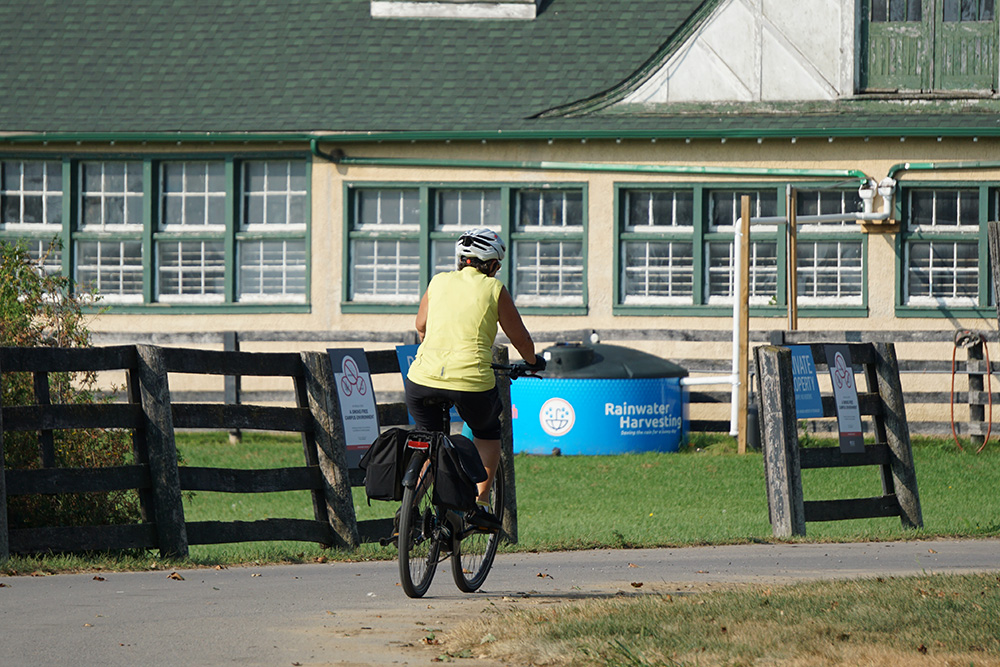Ontario Tech research supports a green light on electrifying active transportation options
University experts say there’s no getting around the fact we need to talk about the future of ‘how’ we get around
October 4, 2022

As urban centres experience rapid population growth, more and more people are trying to get from place to place. While most people still think about transportation from a commuting-to-work perspective, transportation demand continues to grow, even with increased work-from-home arrangements arising from the COVID-pandemic.
Outside of employment considerations, people still want to meet friends, pick-up or drop-off items, and participate in learning and entertainment events. But many communities face a wide range of transportation challenges, such as chronic traffic congestion, a finite number of roads and railways, and limited resources for required infrastructure upgrades. Meantime, consumers are weighing the various costs associated with travel: from public transit fares to the cost of vehicle ownership to the rising price of energy.
Although the futuristic vision of flying vehicles as depicted in the 1960s cartoon show The Jetsons is still a distant dream, there are new means of travel available that are leaping us into the future of transportation. E-micromobilities, in the form of small electric transportation options such as scooters and pedal-assisted e-bikes are popping up everywhere. But one key question is whether we are doing enough yet to learn how to embrace this trend.
Ontario Tech experts examining trends in e-micromobilities
Through funding from the Social Sciences and Humanities Research Council and Infrastructure Canada, Ontario Tech University researchers are exploring ways to better understand what we know about e-bikes. In a recently published paper in the journal Transport Policy, they say e-bike use has the potential to transform personal transportation towards a mode that is eco-friendly, age-friendly, barrier-free, healthy, and cost-effective.
The team is advancing this work with local partners to create a plan for active transportation around the Ontario Tech north Oshawa campus location; and to understand how to better support inclusive and accessible active transportation in Durham Region, so that residents of all ages and abilities, regardless of the neighbourhood they live in, are able to freely move around in their communities.
“Given the growing popularity of these pedal assist e-bikes and other forms of e-micromobilities, there are opportunities for a modal shift where people leave their cars behind, and engage in active forms of transportation that are good for their health, and the health of our planet,” says Dr. Shilpa Dogra, Associate Professor, Faculty of Health Sciences (FHSc) at Ontario Tech. “We are at a critical point in time. Change is coming, and we need to learn how to support the long-term sustainability of these new forms of transportation. The City of Oshawa recently approved an e-scooter pilot project. There are a lot of developments happening in the area of e-micromobilities in municipalities.”
Increasing e-bike use can improve the health and well-being of people and the planet in terms of environmental impact. Transportation is the largest contributor to greenhouse gas emissions in Ontario; innovative and affordable solutions are needed to reduce these emissions. Electric cars are one option, but they do not change the space allocation in our neighbourhoods. They also need lots of material such as lithium in batteries and are heavier than current vehicles; a worrying trend for safety. We need to make room for e-micromobilities as people traveling small daily distances will need conflict free, safe spaces to travel.
“Our review indicates that when it comes to safety and accidents, pedal-assist e-bikes fare as well as a regular bicycle” says Dr. Dogra. “As such, we need to ensure regulations are similar between e-bikes and traditional bicycles. We also need to encourage their uptake by providing subsidies such as those we see for electric cars.”
Team member Dr. Meghann Lloyd, an international expert in adapted physical activity was surprised by the lack of research found on individuals with disabilities.
“Our review indicates very little research has addressed how pedal-assist e-bikes benefit people with mobility challenges, a population arguably most likely to benefit from e-micromobilities,” says Dr. Lloyd, Associate Professor, FHSc. “There was also no research on pedal-assist e-hand cycles for people who use wheelchairs. We believe that these technologies could significantly increase the ability of people with disabilities to participate in recreation and leisure activities, increase independence, and support opportunities for community engagement.”
Research team member Dr. Dan Hoornweg, an international expert in the development of sustainable cities agrees that fairly applied subsidies are needed, and that these can greatly affect our current climate and mobility challenges.
“E-bikes, along with active mobility, anchored at easily accessible transportation nodes, need to be part of future commuting,” says Dr. Hoornweg, Professor, Faculty of Engineering and Applied Science. “This new research paper highlights the need to look at transportation issues in a ‘systems way’, with parts like e-bikes playing a critical role.”
Media contact
Communications and Marketing
Ontario Tech University
communications@ontariotechu.ca






